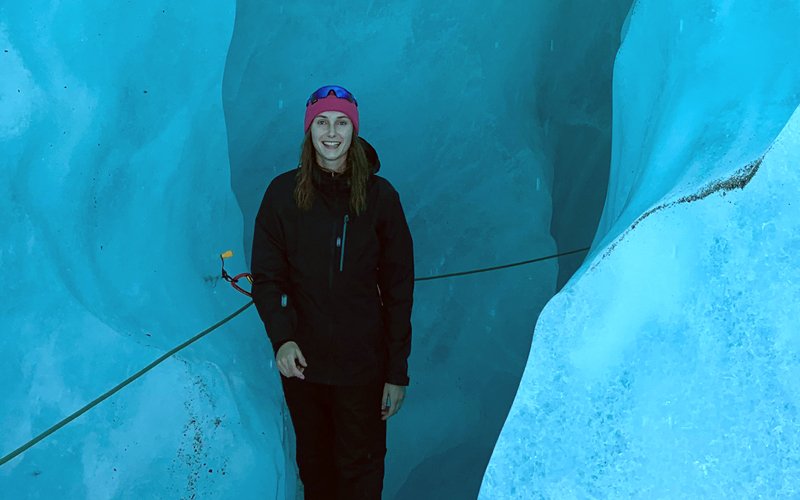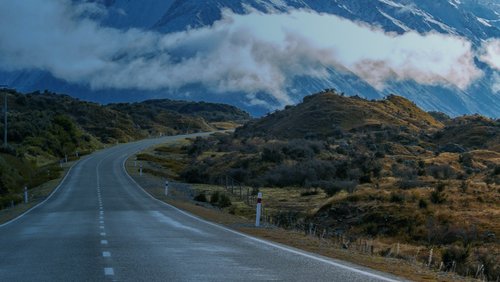14 Feb 2024
Jessica Macfarquhar is a Masters of Engineering student with a very bright future. She was recently awarded the Francis Small scholarship by the Engineering New Zealand Foundation, in collaboration with the University of Canterbury, and is in Antarctica this month to continue her mahi designing and developing new ice coring equipment. Hear from Jessica about what the scholarship means for her research and continued studies, and the global importance of the work she's doing.

Jessica Macfarquhar in Antarctica. Photo: Supplied
Tell us a little bit about yourself and why you applied for the Francis Small Scholarship.
I’m originally from a small town in the Manawatū-Whanganui region called Pahiatua. Living there I spent a lot of time around cars, motorcross, and on the farm. Seeing how these machines moved and made peoples’ lives easier, along with my love for making anything and everything, is what got me into mechanical engineering at the University of Canterbury.
In my final year of my Bachelor of Mechanical Engineering, I had the privilege to work as part of a group on an ice coring drill for the Tere Tīpako Tio: Rapid Extensive Antarctic Ice Sampling Project. This was an incredible opportunity. I was able to learn about polar engineering – which was all entirely new to me – and I loved learning as I went, knowing that my work was going to play a small role in addressing the climate change crisis.
An increase in the sea level will be catastrophic for New Zealand, so we need to be aware of the potential risk to be able to mitigate it in the future.
I applied for the Francis Small scholarship to continue my development on this project and to allow me to continue working as a part of Lads without Labels, a University of Canterbury-based mental health charity. I believe mental health needs to become a more important aspect in everyone’s lives. I help facilitate this by organising fundraising and awareness events, such as Run72, as well as oversee several initiatives such as the Lads without Labels counselling fund.
What does receiving the scholarship mean to you?
Receiving the scholarship is an incredible privilege that goes beyond the financial assistance. It’s assisting me to build a relationship with and get support from Engineering New Zealand, allowing me to start building a career in the engineering field while I am still conducting my research. Being linked to Francis Small and his incredible career has inspired me to continue learning and immersing myself if various engineering fields.
Let’s hear the ‘elevator pitch’ for your research project – what’s it all about?
My research project is designing and developing new ice coring equipment to be used as a part of the Tere Tīpako Tio: Rapid Extensive Antarctic Ice Sampling Project. The aim of this equipment is to collect ice core samples from Antarctic ice sheets to measure the physical properties of different sections of the ice. The grain size and orientation of the ice crystals are key parameters that indicate what direction the ice is moving in, and how fast. The physical properties of the ice collected will be used to advance models that predict ice sheet flow, which are crucial to determine the sea level rise of the coming years.
The specific ice coring equipment that I'll be developing in 2024 will be a variation of a side wall corer. The aim of this device will be to stop at any depth in a dry hot water drilled borehole and collect a sample using a whipstock mechanism which has been utilised in the carbon industry. This is a unique development and allows numerous samples to be collected at different depths within a day, drastically speeding up the sample collection process.
What makes research work in Antarctica so important?
Antarctic research is vital with the changing climate as it contains the globe’s largest ice sheets. With warming temperatures, the ice is moving faster and melting quicker than it can be replaced with new snow. Antarctic research work is key to develop predictive sea level rise models. An increase in the sea level will be catastrophic for New Zealand, so we need to be aware of the potential risk to be able to mitigate it in the future.
Where do you see yourself in five years, having undertaken your research?
The climate and the polar engineering industry are changing rapidly, so I’m not too sure where I’ll be in five years. But, I know I’ll still be learning new things and using my knowledge to help others, whether it be in an engineering consultancy, a PhD position, or in a scientific research role.
So, you must enjoy cold weather?
I love a day snowboarding or skiing but I’m unsure about how I’ll handle the constant cold temperatures!
Finally, each staff member at Engineering New Zealand has their own ‘Engineering Envy’ – a feat of engineering that inspires them or is of personal significance. What's yours?
As I continue learning, different aspects of engineering inspire me at different times. One feat of engineering that constantly inspires me is the use of wind turbines to generate electricity. I see them every time I drive over the Tararua Ranges, so they also remind me of home.
The Engineering New Zealand Foundation is here for the profession – whether it’s supporting the next generation through scholarships, financially assisting Engineering New Zealand members through tough times, or funding innovative initiatives that’ll drive systemic change.




